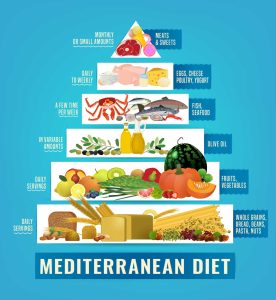The Mediterranean diet is a way of eating that emphasizes whole, minimally processed foods that are common in the Mediterranean region. This diet has been linked to numerous health benefits, including a reduced risk of heart disease, diabetes, and certain cancers. If you’re interested in trying out the Mediterranean diet, here are some recipes and meal plans to get you started.

Breakfast:
- Greek yogurt with fresh berries and a drizzle of honey
- Scrambled eggs with spinach and feta cheese
- Oatmeal with sliced almonds, cinnamon, and chopped dates
Lunch:
- Mediterranean salad with mixed greens, cherry tomatoes, cucumber, red onion, olives, and feta cheese, dressed with olive oil and red wine vinegar
- Hummus with sliced vegetables and whole-grain pita bread
- Grilled chicken or fish with roasted vegetables, such as zucchini, eggplant, and bell peppers
Dinner:
- Grilled or baked salmon with a side of quinoa and roasted asparagus
- Chicken souvlaki with a Greek salad and roasted potatoes
- Spaghetti squash with tomato sauce, garlic, and herbs, topped with grated Parmesan cheese
Snacks:
- Fresh fruit, such as apples, oranges, and grapes
- Nuts and seeds, such as almonds, pistachios, and sunflower seeds
- Roasted chickpeas seasoned with herbs and spices
The Mediterranean diet is based on the following principles:
- Eating plenty of vegetables, fruits, whole grains, and legumes
- Consuming healthy fats, such as olive oil, nuts, and seeds, in moderation
- Eating fish and seafood at least twice a week
- Limiting red meat and processed foods
- Using herbs and spices to flavor food instead of salt
- Enjoying meals with family and friends and savoring food slowly
One of the key components of the Mediterranean diet is olive oil, which is high in heart-healthy monounsaturated fats. Try using olive oil as your main cooking oil and in salad dressings. You can also enjoy olives, which are a good source of healthy fats and antioxidants.
Another staple of the Mediterranean diet is fish and seafood, which are rich in omega-3 fatty acids that can help lower inflammation and improve heart health. Try incorporating fatty fish like salmon, mackerel, and sardines into your diet at least twice a week.
Whole grains like whole wheat, brown rice, and quinoa are also a key part of the Mediterranean diet. They are rich in fiber, which can help keep you feeling full and satisfied. Try swapping out refined grains like white bread and pasta for whole-grain versions.
In summary,
Mediterranean diet is a delicious and healthy way of eating that emphasizes whole, minimally processed foods. By following the principles of the Mediterranean diet and incorporating the recipes and meal plans above, you can enjoy the health benefits of this eating pattern while enjoying delicious, satisfying meals.


